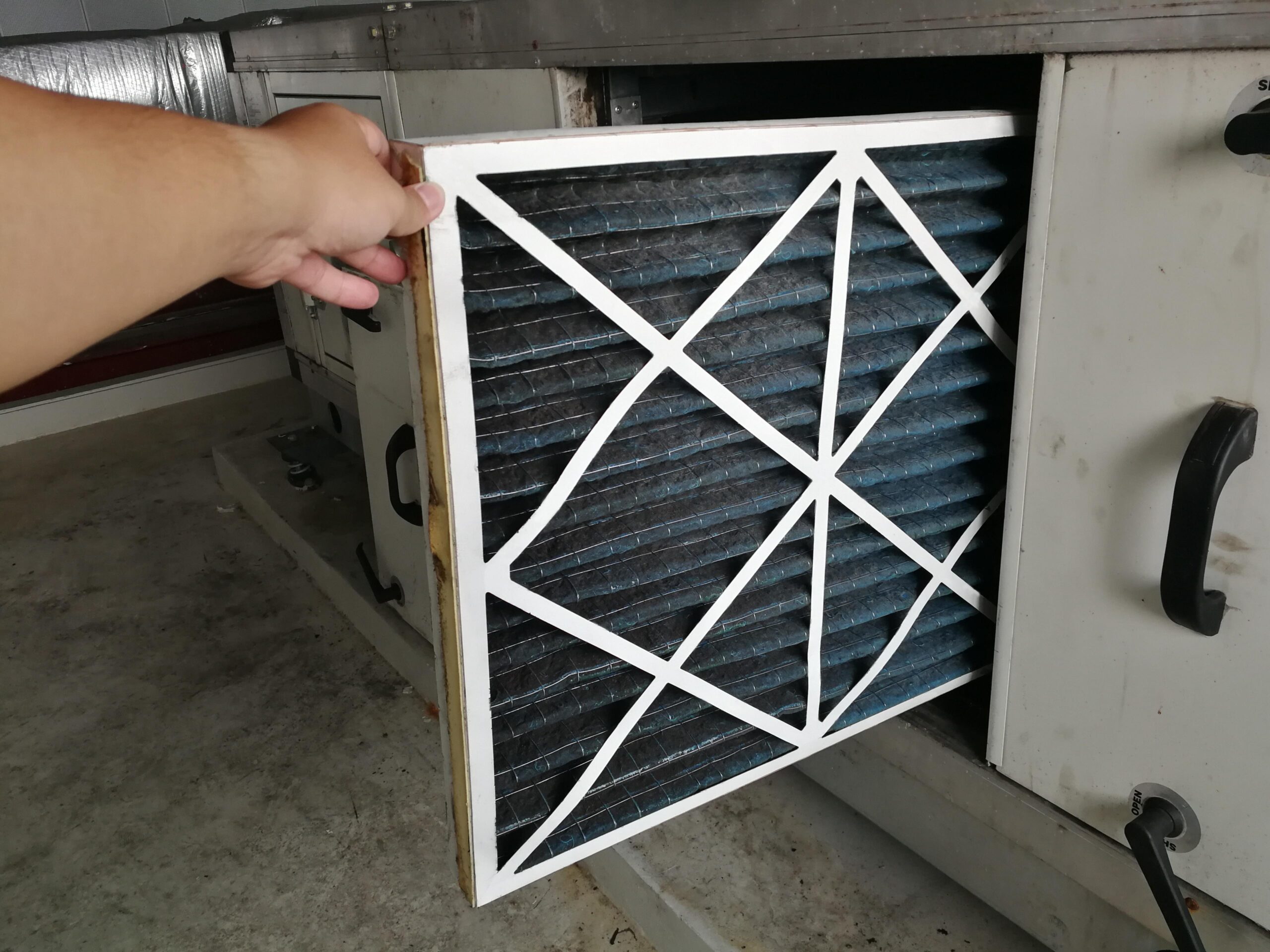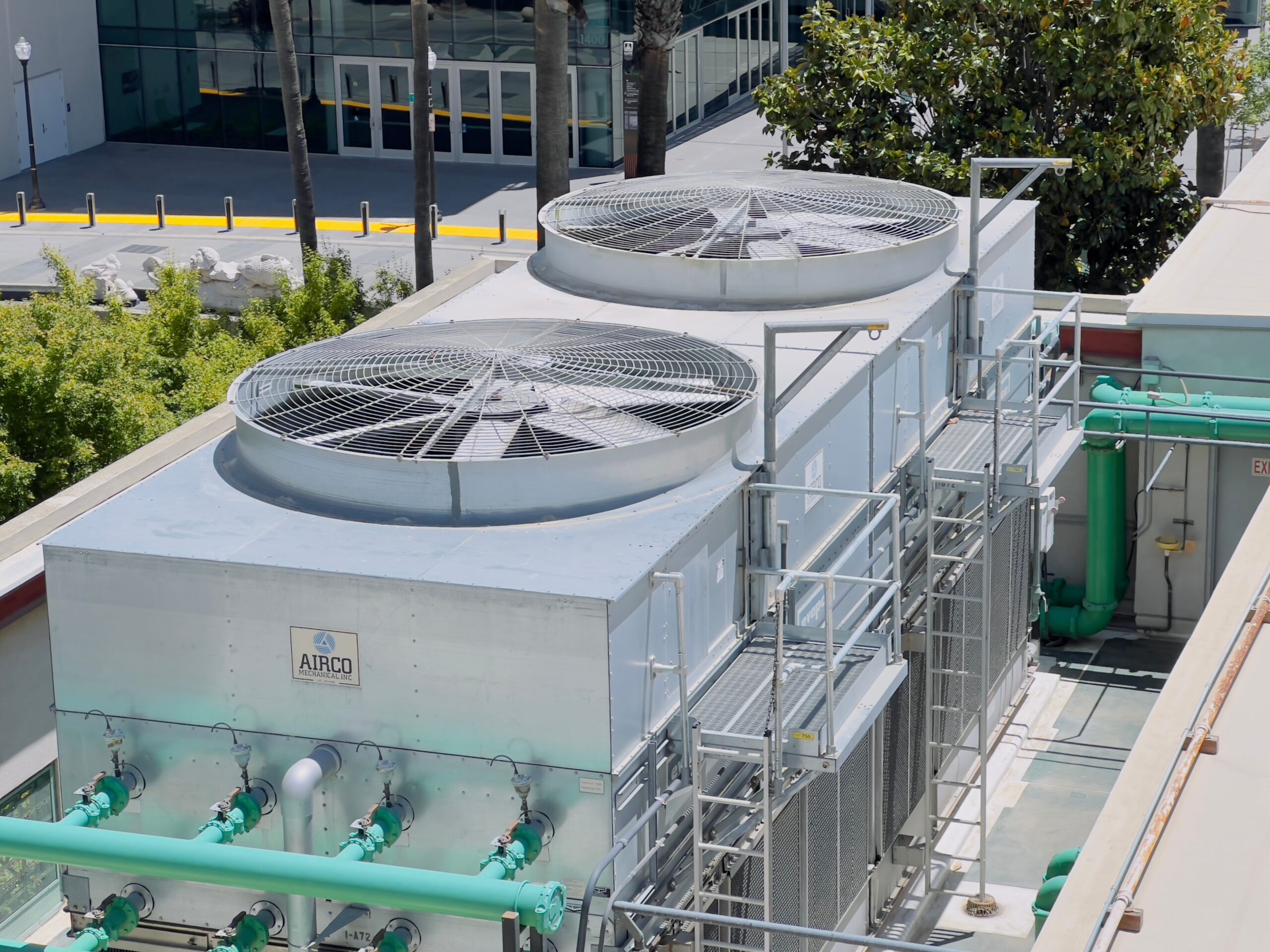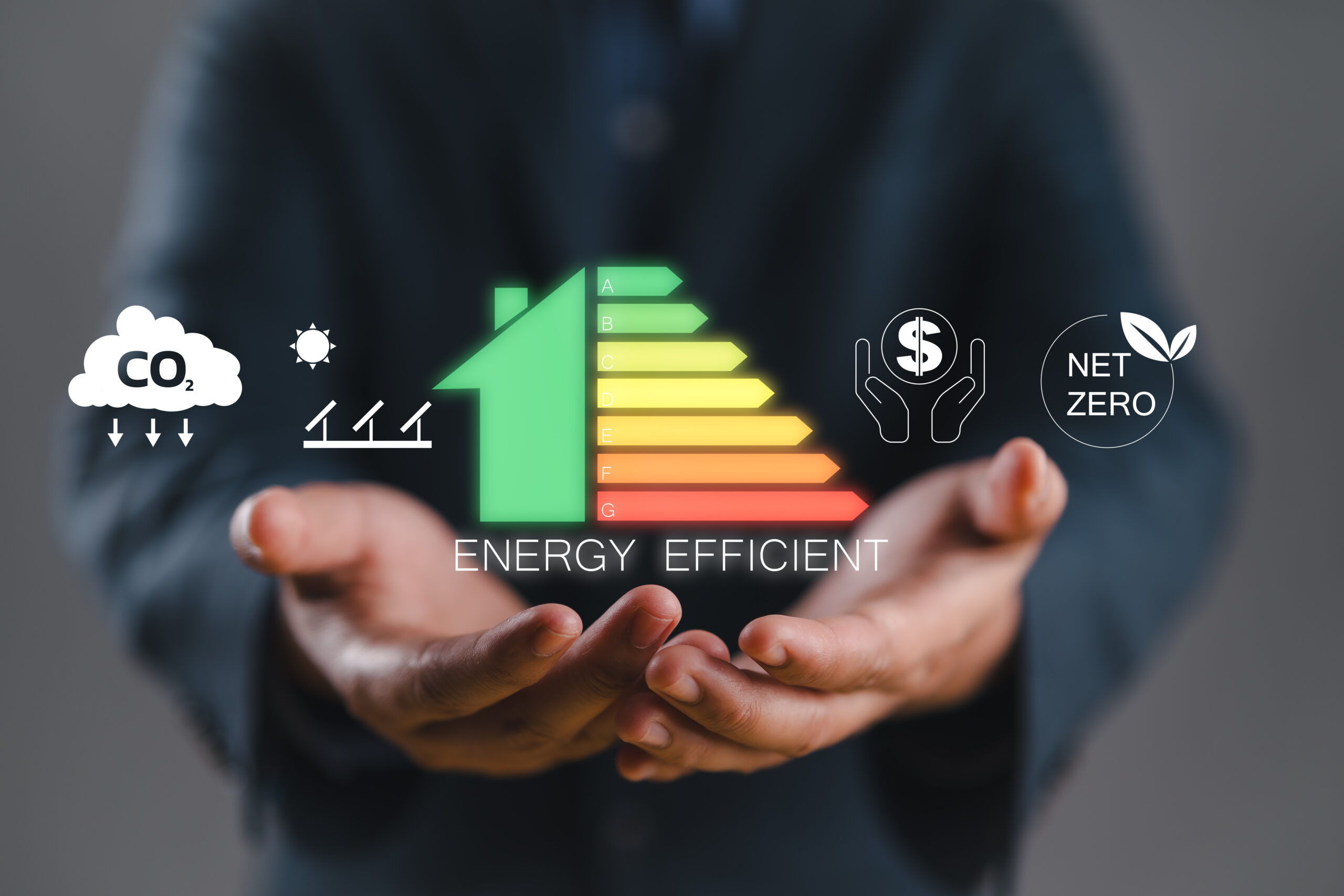Choosing the Right Air Filters: A Comprehensive Guide to MERV Ratings
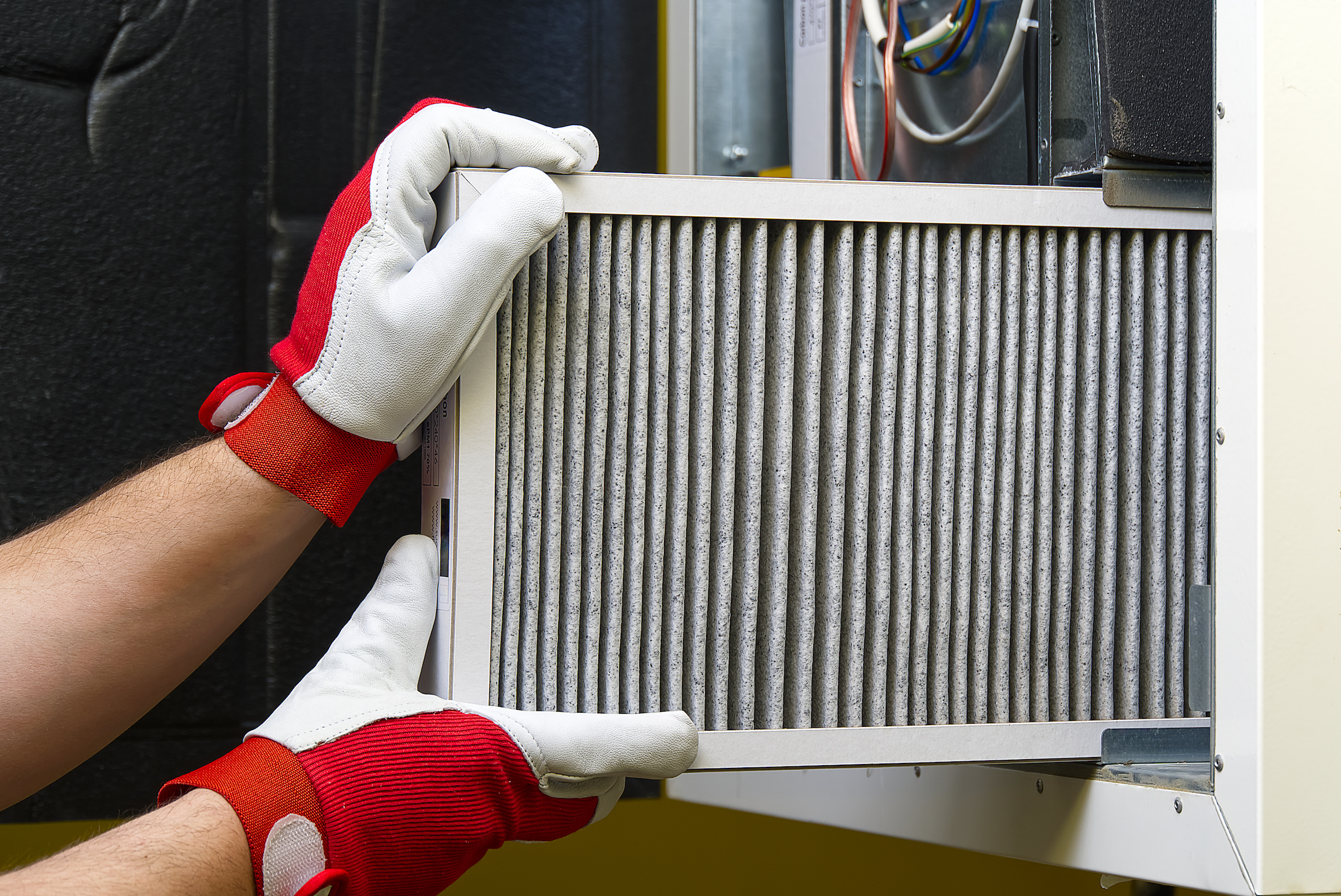
Air filters play a crucial role in maintaining your HVAC system’s optimal performance and ensuring your indoor environment’s well-being. An air filter’s effectiveness is often measured by its MERV rating, which is a key factor in determining its filtration capabilities. In this guide, we’ll explore the world of air filters, common misconceptions, and the significance of MERV ratings to help you choose the right one for your residential or commercial property.
What to Know About Air Filters
Air filters are the unsung heroes of HVAC systems, designed to trap and remove airborne particles, allergens, and contaminants. It’s important to understand how to properly maintain, replace, and handle your system’s filter to uphold system efficiency and indoor air quality. Here’s what to know about air filters:
- Not all filters are the same: There are various types of air filters, each of which can come in different sizes and MERV ratings. Which type of air filter you choose will ultimately depend on your specific HVAC unit, so ensure you have the right specifications before you buy.
- They do more than just prevent dust buildup: Proper air filtration can help prevent excessive dust build-up, but it goes far beyond that to improve air quality. The right filter can remove allergens, dirt, pet dander, and even dust mites, mold spores, and more.
- They require frequent replacement for optimal efficiency: A common misconception is that air filters only need to be replaced every three months or when the seasons change. Basic air filters should be changed every 30 days, and pleated air filters should be changed every 90 days. However, each replacement schedule is unique and will depend on its operating environment. It may need more frequent replacement if exposed to particularly dirty conditions.
- Filters are a requirement for an HVAC unit: Unfortunately, some believe that filters are a gimmick, and they don’t need to spend money on them for their HVAC system to work. Not using an air filter in your HVAC unit can lead to various complications, such as poor air quality, higher utility costs, a frozen AC unit, or ductwork issues. These complications can also occur in overly worn air filters.
Types of Air Filters for HVAC Systems
New designs and technologies have created diverse air filter designs, including fiberglass, pleated, HEPA, electrostatic, and UV filters, and each type caters to specific needs and preferences. Here’s what to know about these different types of filters:
- Fiberglass: These are the most common filter types, doing an acceptable job at filtering large particles and maintaining the HVAC system. While these are often chosen for simplicity and lower cost, they make minimal, if any, impact on indoor air quality.
- Pleated or Polyester: These filters are a bit pricier than fiberglass, but they make a more noticeable impact on your home’s cleanliness and air quality. They also offer a higher MERV rating that is still residential-system friendly.
- HEPA: HEPA filters provide some of the best air quality control and HVAC safety available, mainly used in large industrial facilities. These filters are impractical for homes as they are more likely to break important system parts and drastically reduce your home’s comfort quality and cooling.
- Electrostatic: These filters utilize static electricity through cotton and paper fibers to act as a magnet, trapping pollutants within the screen. Electrostatic filters are great for those with allergies as they help prevent the spread of allergens throughout the home. For added efficiency, some will come with a carbon filter. These filters are also available in different styles, including flat-panel, pleated, washable, and disposable.
- UV: UV filters are often part of more advanced filtration mechanisms, like HEPA filters, and kill bacteria and viruses using short-wave UV light, disinfecting the air with germicidal radiation as it passes through. These are great at ridding your home of harmful microorganisms, like mold spores, but less effective with other pollutants like dust. They also potentially convert oxygen molecules into ozone molecules, which can cause coughing or chest pains in small amounts or make asthma and other respiratory diseases worse in larger amounts.
Regular Maintenance and Replacement
Maintaining optimal indoor air quality requires a commitment to regular air filter maintenance and replacement. Healthy air can protect your family from illnesses and prevent exposure to issues like dust mites, mold, secondhand smoke, fumes from household chemicals, and more. Ensuring you stick with a recommended replacement schedule and properly maintain your HVAC system, in general, will keep everything functioning optimally and your space healthy.
Understanding MERV Ratings
MERV ratings, which stands for Minimum Efficiency Reporting Values, are pivotal in determining the efficiency of air filters. Ranging from 1 to 16, the MERV rating for a residential furnace indicates a filter’s ability to capture particles of varying sizes. Understanding the MERV rating can help when comparing different filters to determine which will perform the best for your needs. Filters with higher MERV ratings indicate they are better at trapping specific particle types and sizes.
MERV filter ratings were created from a test method developed by the American Society of Heating, Refrigerating, and Air Conditioning Engineers (ASHRAE). According to the standard MERV rating guide, filters with a rating of 1-4 are less than 20% effective at trapping 3.0 – 10.0 micron particles. On the higher end, filters with a rating of 16 are at or above 95% effective at trapping 3.0 – 10.0 micron particles.
The only filters that offer ratings of the MERV scale are high-efficiency particulate air filters or HEPA. Particles that fall within the 0.3-micron range are captured with 99.97% efficiency, and those that are larger or smaller are captured with even greater efficiency.
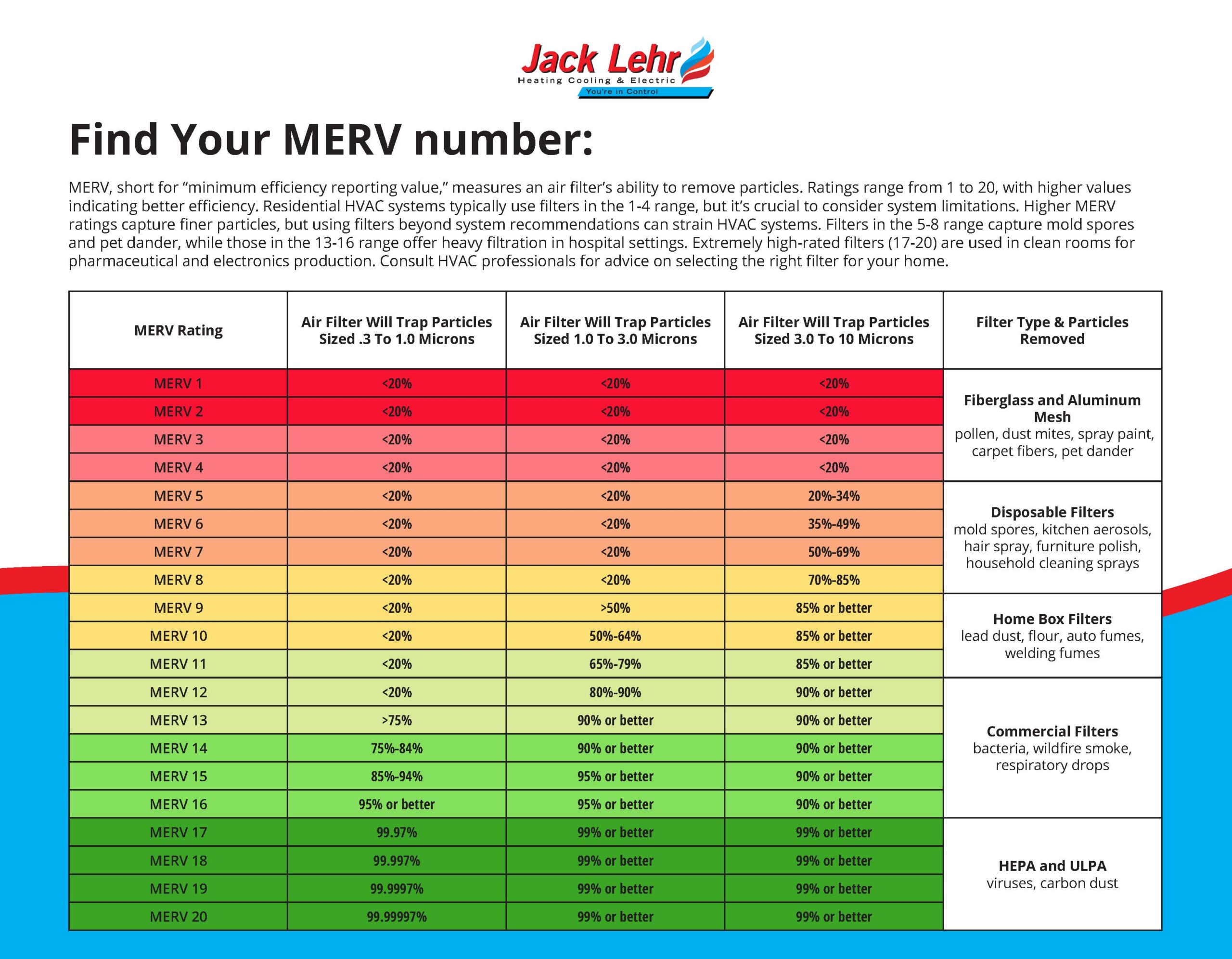
Download the MERV Rating Chart
How to Choose the Right MERV Rating for Your Furnace
Choosing the right filter based on MERV rating is a balancing act between filtration efficiency and system capability. The best place to begin your research is by referencing your HVAC system’s owner’s manual. The manual will indicate the recommended maximum MERV rating. Installing a filter with a higher value than what is recommended will affect your system’s efficiency and could potentially lead to expensive repairs.
In addition to researching the manufacturer’s recommendation, consider other factors, such as family health needs. Those with asthma or allergies or shedding pets in the home should look for filters with a MERV rating that falls above the recommended range. Your family’s or property’s needs will also help you determine the specific type of filter you should purchase, but again, ensure the type you choose is compatible with your HVAC system.
Commercial vs. Residential MERV Ratings
There are some differences to note when exploring the MERV rating for residential furnace systems vs. commercial systems. Commercial and residential HVAC systems have to take into account different needs. Here are the main differences when exploring filter options for commercial vs. residential systems:
- Commercial: These structures ideally have higher interior pressure than external. Buildings with insufficient pressurization and several openings in the building envelope require air filters with higher MERV ratings. However, this could result in increased utility costs and higher initial investment. Businesses must also consider the types of pollutants or contaminants they work with to determine if higher filtration is necessary to keep employees and visitors safe.
- Residential: Maximum MERV ratings for home systems are limited by manufacturer recommendations. However, which level you choose within that range is determined by other factors, such as pets in the home, occupants with respiratory health concerns, smokers, and how many people live in the home. Choosing a filter with a higher MERV rating can ensure your family is better protected from certain pollutants and allergens. In homes, there’s usually much less concern about dangerous fumes and particles found in industrial settings, so looking for an excessively strong filter is unnecessary.
Make the Right Choice for Indoor Comfort with Jack Lehr
Choosing the right air filter is crucial for indoor comfort, health, and air quality. Utilize the MERV chart to help make an informed decision, and reach out to the professionals at Jack Lehr for assistance in choosing and installing the ideal air filter for your HVAC system. Your home or property deserves the best, and we are here to ensure you achieve it.
Contact us or schedule your service online and elevate your indoor living experience.
Questions or need more information?
Contact Us


We Treat You Like Family
When you choose Jack Lehr Heating Cooling & Electric, you’ll benefit from our:
When you choose Jack Lehr Heating Cooling & Electric, you’ll benefit from our:
- 50+ years of experience
- Our installation and service guarantees
- Top-of-the-line products
- Respect for your home or business
- Financing options
- And much more!

